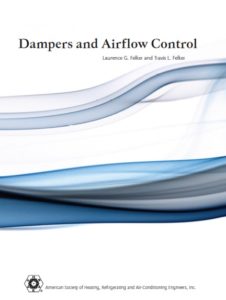Dampers and Airflow Control
Dampers and Airflow Control
Dampers and Airflow Control is the first book of its kind. It bridges the gap between mechanical design and final damper control. This book covers not only theoretical aspects of application design but also practical aspects of existing applications, and the material applies to both new and retrofit projects.
Fans, duct systems, duct elements (such as filters and coils), dampers, and actuators all work together to control airflow. This text provides resources for building good judgment of the engineering principles needed to size, select, install, and adjust control dampers. Mechanical designers; mechanical and control contractors; and testing, adjusting, and balancing (TAB) contractors are the target audience of this book. Each specializes in a different part of the heating, ventilating, and air-conditioning (HVAC) system.
Some material presented here is already familiar to each of these groups, and some material falls outside their normal areas of concern. For example, the information on loss coefficients and pressure loss is basic to the mechanical engineer; however, it is unfamiliar to most control contractors. Much of
the subject material bridges gaps that exist between disciplines. The gaps observed in air systems are as follows:
• Lack of understanding of the final control element—the damper
• Lack of understanding of the detailed methods of the other
You can also Read ASHRAE Design Guide for Cool Thermal Storage Second Edition 2019
Dampers and Airflow Control Content
- Acknowledgments
![Dampers and Airflow Control]()
- Introduction
- Mechanical System Design and Airflow
- Dampers, Mixing, Geometry, and Pressure Loss
- The Damper Pressure Losses
- Damper Proportional Flow Characteristics
- Diverting and Mixing Damper Pairs
- Multistage Damper Control
- Summary of Damper Characterization Methods
- Actuation
- Minimum Outdoor-Air Control Methods
- Space Pressurization Control Methods
- Coordination of Outdoor-Air Ventilation with Space Pressure
- Damper Installation
- Control Loops and Applications
- Balancing
- Control Systems
- Smoke Control
- Summary
- A: Full-Open Damper and Similar Shape Coefficients
- B: Equations
- C: Sample Results from ASHRAE RP-1157
- References
- Index
mechanical design; however, they must be included as a part of the design for maximum effectiveness. Controls cannot compensate for many mechanical design problems. Since each building is unique, and the mechanical system must work the first time, design is critical. Of course, the space, money, and time constraints placed on the mechanical designer are sometimes severe and shortsighted on the part of the architect and owner if long term quality is a goal.


Do yuu have other link that is not file-upload. I can not load from this site.
All the links come in file-upload as it will not delete all one time